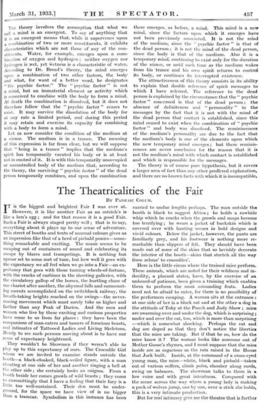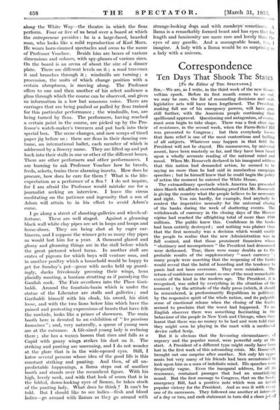The Theatricalities of the Fair
CoLum. BY PADRAIC.
IT is the biggest and brightest Fair I was ever at. However, it is like another Fair as an ostrich's is like a hen's egg ; and for that reason it is a good Fair. Such a Fair is always staged pretty well ; that is to say, everything about it plays up to our sense of adventure. This street of booths and tents of unusual colours gives us an impression like that of a herd of piebald ponies—some- thing remarkable and exciting. The music seems to be escaping out of containers of sound and celebrating its escape by blares and trumpetings. It is nothing but uproar set to some sort of tune, but how well it goes with the expectancy we all feel when we go into a Fair—an ex- pectancy that goes with those turning wheels-of-fortune, with the cracks of carbines in the shooting galleries, with the circulatory gallop of the horses, the hurtling chase of one chariot after another, the abysmal falls and surmount- ing ascents accomplished on the switchback railway, the breath-taking heights reached on the swings—the never- eeasing movement which must surely-take us higher and farther than any Peak of Darien. And the men and women who live by these exciting and curious properties have come to us from far places : they have been the companions of man-eaters and tamers of ferocious beasts, and intimates of Tattooed Ladies and Living Skeletons. Merely to see such persons moving about is to have our sense of expectancy heightened.
They wouldn't be Showmen if they weren't able to play up to this expectancy of ours. The Crocodile Girl whom we are invited to examine stands outside the booth—a black-cloaked, black-veiled figure, with a man shouting at one side of her and another ringing a bell at the other side ; she certainly looks an enigma. From a booth beside her comes growls of wild beasts ; they come so unremittingly that I have a feeling that their fury is a little too well-sustained. Their den must be under- ground, for the space we have view of is no bigger than a tramcar. Symbolism in this instance has been carried to undue lengths perhaps. The man outside the booth is black to suggest Africa ; he holds a rawhide whip which he cracks when the growls and snaps become too terrifying ; he wears a jacket of buckskin which is covered over with hunting scenes in bold designs and vivid colours. Below the jacket, however, the pants are familiarly grey, and his footwear is nothing more re- markable than slippers of felt. They should have been made out of some of the skins that so lavishly decorate the interior of the booth—skins that stretch all the way from zebras' to crocodiles'.
Here is the little circus where the trained mice perform. These animals, which are noted for their wildness and in- docility, a placard states, have, by the exercise of an unheard-of patience, been given a training which enables them to perform the most astounding feats. Ladies need not be afraid to enter, for there is no possibility of the performers escaping. A woman sits at the entrance : at one side of her is a black cat and at the other a dog in the attitude of Toby at the Punch and Judy Show ; mice are swarming over and under the dog, which is surprising ; under and over the cat, too, which is more than surprising —which is somewhat shocking. Perhaps the cat and dog are doped so that they don't notice the liberties that the mice are taking. But if that be so, how do the mice know it ? The woman looks like someone out of Mother Goose's rhymes, and I must suppose that the mice inside are as sagacious as the rats raised in the House that Jack built. Inside, at the command of a cross-eyed young man, the mice—white, black and piebald—taken out of various coffers, climb poles, clamber along cords, swing on balances. The showman talks to them in a low voice and with great intentness. Compared with the scene across the way where a young lady is making a pack of wolves jump, one by one, over a stick she holds, this is a very intimate production.
But for real intimacy give me the theatre that is further along the White Way—the theatre in which the fleas perform. Four or five of us bend over a board at which the entrepreneur presides : he is a large-faced, bearded man, who looks like a mild reproduction of Karl Marx. He wears horn-rimmed spectacles and owns to the name of Professor Voschov. Beside him are boxes of various dimensions and colours, with spy-glasses of various sizes. On the board is an arena of about the size of a dinner plate. There are different levels on it ; a road traverses it and branches through it ; windmills are turning ; a procession, the units of which change position with a certain abruptness, is moving along. The Professor offers to one and then another of his select audience a glass through which the course can be observed, and gives us information in a low but sonorous voice. There are carriages that are being pushed or pulled by fleas trained for this particular performance ; the windmills, too, are being turned by fleas. The performers, having reached a certain point in the course, are picked up by the Pro- fessor's watch-maker's tweezers and put back into their special box. The scene changes, and now scraps of tinsel paper jig before us : 'these are fleas in their dancing cos- tume, an international ballet, each member of which is addressed by a flowery name. They are lifted up and put back into their stalls in one or other of the different boxes. There are other performers and other performances. I am burning to ask Professor Voschov how he breeds, feeds, selects, trains these alarming insects. How does he procure, how does he care for them ? What is the life- expectation as a performer of a flea ? I do not inquire, for I am afraid the Professor would mistake me for a journalist seeking an interview. I leave the circus meditating on the patience and ingenuity that a son of Adam will attain to in his effort to avoid Adam's curse.
I go along a street of shooting-galleries and wheels-of- fortune. These are well staged. Against a gleaming black wall white clay pipes are set in loops and hoops and horse-shoes. They are being shot at by eager car- bineers, and I suppose the winner gets as many clay pipes as would last him for a year. A thousand glazed and glossy and gleaming things are in the stall before which the great pictured wheel turns. In another stall are crates of pigeons for which boys will venture sous, and in another poultry which a household would be happy to get for Sunday's pot—geese with necks held up guard- ingly, ducks frivolously preening their wings, hens placidly roosting, a bantam strutting as if parodying the Gaulish cock. The Fair overflows into the Place Gari- baldi. Around the fountain-basin which is under the statue of the Liberator are stalls and galleries ; and Garibaldi himself with his cloak, his sword, his shirt loose, and with the two lions below him which have the pained and protesting expressions of beasts that have felt the rawhide, looks like a prince of showmen. The main booth here is devoted to an exhibition of " lee passions humaines" ; and, very naturally, a queue of young men are at the entrance. A life-sized young lady is reclining there ; she has a waxen bosom that rises and falls as a Cupid with gauzy wings strikes his dart on it. The striking and panting are unceasing, and I do not wonder at the glare that is in the wide-opened eyes. Still, I knbw several persons whose idea of the good life is this constant striking and panting. And then, of all un- predictable happenings, a • llama steps out of another booth and stands over the recumbent figure. With his high, lovely neck, and with that look of scorn that is in the lidded, down-looking eyes of llamas, he takes stock of the panting lady. What does he think ? It can't be told. But I should like to see ladies—flesh and blood ladies—go around with llamas as they go around with strange-looking dogs and with monkeys' sometimes. A llama is a remarkably formed beast and has eyes that for length and luminosity are more rare and lovely than the eyes of any gazelle. And a manageable beast, too, I imagine. A lady with a llama would be as surprising as a lady with a unicorn.









































 Previous page
Previous page